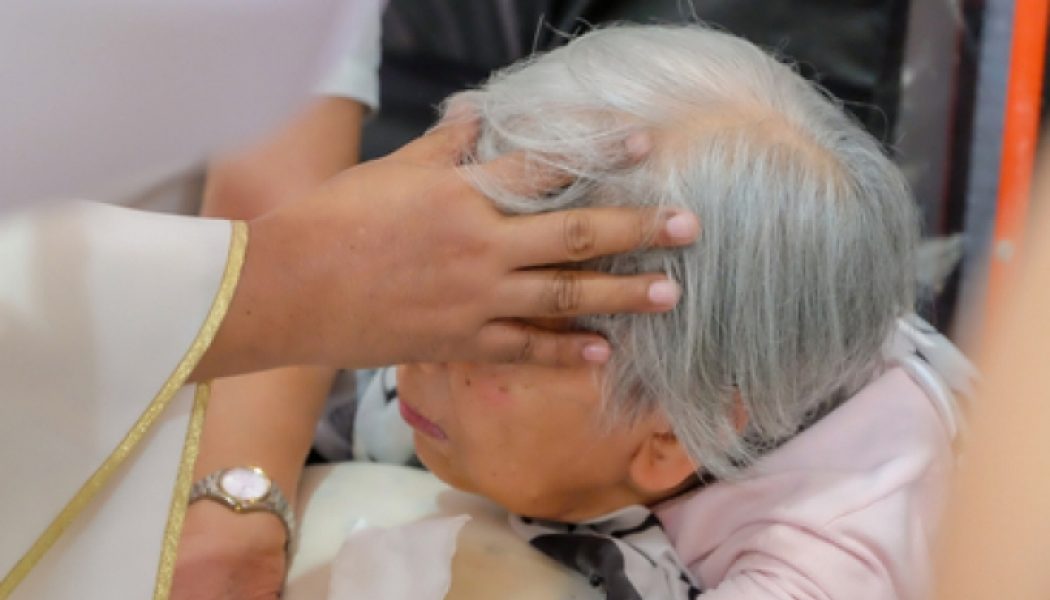
Priest anoints a woman’s head with oil. (Shutterstock)
Bishop ‘Suspends’ Sacramental Anointing While Rescinding Controversial Policy
The sacramental anointing of the sick is conferred upon those Catholics who are in danger of death.
JD Flynn/CNA.
WASHINGTON, D.C. — After rescinding a controversial policy concerning sacramental anointing of the sick, the bishop of Springfield, Massachusetts told priests Friday afternoon that anointing of the sick is “suspended” within the Diocese of Springfield.
Earlier this week, Bishop Mitchell Rozanski authorized a change to norms for the sacrament of the anointing of the sick, permitting a nurse, rather than a priest, to conduct the physical anointing, which is an essential part of the sacrament.
“I am allowing the assigned Catholic hospital chaplains, standing outside a patient’s room or away from their bedside, to dab a cotton swab with Holy Oil and then allow a nurse to enter the patient’s room and administer the oil,” Bishop Rozanski told priests in an email March 25.
On Friday afternoon the diocese told CNA it had rescinded that policy.
In fact, Bishop Rozanski emailed Springfield priests Friday afternoon explaining that “After further discussion and review, I am rescinding my previous directive and temporarily suspending the Anointing of the Sick in all instances.”
The sacramental anointing of the sick is conferred upon those Catholics who are in danger of death.
“The first grace of this sacrament is one of strengthening, peace and courage to overcome the difficulties that go with the condition of serious illness or the frailty of old age. This grace is a gift of the Holy Spirit, who renews trust and faith in God and strengthens against the temptations of the evil one, the temptation to discouragement and anguish in the face of death,” according to the Catechism of the Catholic Church.
“This assistance from the Lord by the power of his Spirit is meant to lead the sick person to healing of the soul, but also of the body if such is God’s will. Furthermore, ‘if he has committed sins, he will be forgiven,’” the catechism adds.
The catechism explains that “as soon as anyone of the faithful begins to be in danger of death from sickness or old age, the fitting time for him to receive this sacrament has certainly already arrived.”
According to the Church’s canon law, parish pastors “have the duty and right of administering the anointing of the sick for the faithful entrusted to their pastoral office. For a reasonable cause, any other priest can administer this sacrament with at least the presumed consent of the priest mentioned above.”
Canon law specifies certain circumstances under which the sacrament is expected to be administered, among them are cases “of doubt whether the sick person has attained the use of reason, is dangerously ill, or is dead,” and when a sick person has “at least implicitly requested it when they were in control of their faculties.”
In his Friday email to priests, Bishop Rozanski noted that the diocesan Chrism Mass would be postponed, and told priests that “Should you run out of either the Oil of the Sick or Oil of the Catechumen, you may bless these oils to replenish your stock.”
The Church’s canon law says that bishops and their equivalents in law can bless the oil to be used in anointing of the sick, while other priests may do so “in a case of necessity, but only in the actual celebration of the sacrament.”
The Diocese of Springfield did not respond to questions regarding the intended length of Bishop Rozanski’s temporary suspension.
The bishop’s Friday announcement came as the chairman of the U.S. bishops’ conference liturgy committee issued a memo to U.S. bishops, informing them that “with regard to the Anointing of the Sick, it is not possible for the anointing with oil to be delegated to someone else, such as a nurse or doctor.” That memo seemed to refute the liceity of Rozanski’s March 25 policy.








